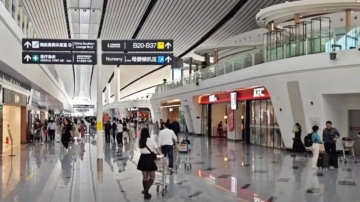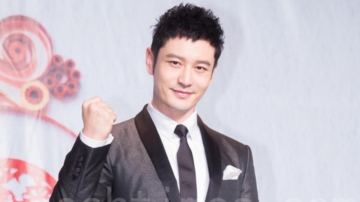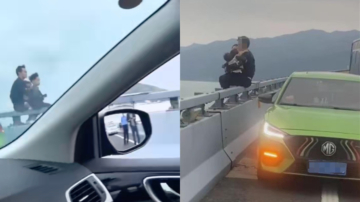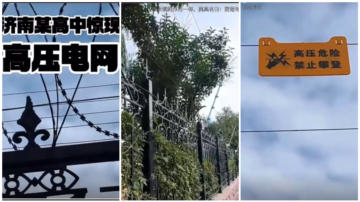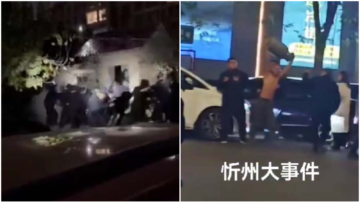【新唐人2014年04月05日訊】在浙江杭州的千年古剎「靈隱寺」內,竟多了一批隨時攜帶「武器」的保安人員。這支所謂的「反恐防護小組」,在全大陸寺院中屬於首創,小組成員一般是僧人。這個消息在輿論界引起軒然大波。其中到底有甚麼不為人知的內情嗎?我們一起來看看。
始建於中國東晉咸和元年(西元326年)的杭州「靈隱寺」,至今已有約1700年的歷史,是佛教禪宗十大古剎之一。
大陸《中新網》報導,「靈隱寺」4月1號成立的「反恐防護小組」,是全大陸寺廟的首舉。小組目前有45名組員,由「靈隱寺」20名法師和25名保安組成。
「靈隱寺」的覺恆法師表示,參與「反恐防護小組」的法師「白天念佛、晚上訓練」。他說,成立這個小組,可以加強寺院面對突發恐怖事件的防範意識,而小組成立的主要原因,緣起於3月1號的昆明火車站恐怖暴力事件。
不過,這一做法似乎不太被外界所待見。
大陸維權人士胡佳:「它(寺院)給人的氛圍、印象,應該是比較祥和、比較寬鬆的狀態,除了少林寺有武僧之外,我還真沒聽說過各地哪所寺廟需要那樣去成立所謂反恐小組。看起來是有點滑稽的。說看護寺院這是可以的,但不是涉及到所謂反恐這個地步的。不知道是哪個黨委書記或政法委書記想出來的花樣。」
杭州網路作家昝愛宗向《自由亞洲電臺》表示,佛教單位參與反恐,似乎有失偏頗。公安局、政府要做的工作,居然讓法師、和尚來做,他認為這是荒唐可笑的。
大陸維權人士胡佳分析,中共當局把警力投入到對異議者、維權人士和百姓合法訴求的維穩上去,槍口對錯地方,力量用錯地方,所以導致如今寺廟反恐這種滑稽現象的出現。
「靈隱寺」組建反恐小組的消息,在中國網路上也引來不少爭議。
微博「大V」名人「老徐時評」在微博發表評論說:看了這種報導心中真不是滋味。本該清靜的寺廟竟也草木皆兵。究竟是甚麼讓我們的生活變得如此的不安全?
網友「楚-舒」認為:佛門清淨地,妄動刀兵。
那麼,這其中究竟有甚麼深層的原因嗎?
中國憲政學者陳永苗:「靈隱寺可能比較特殊,因為靈隱寺裡面供了一個牌位,可能是全中國或者全世界都沒有的,寫著中華人民共和國萬歲。還有,江澤民經常到那邊去上香,就是說它和(中共)最高層的關係相當緊密,相當於中共暗中的朝庭寺廟。」
中國憲政學者陳永苗認為,「靈隱寺」成立維穩小組,不是在維穩意義上的反恐,而是擔心一些中共高層到寺廟上香的時候,安全沒有保障。而從這個事情來看,中國的佛教在某種意義上,已經很大程度上喪失了佛教的精神。
胡佳:「在宗教領域,中共管控、滲透的還是很深的。可以說幾乎操控著比較大的宗教場所的各種權力。在後邊隱形的影子中,比如就像佛教學會的黨委一樣,那才是(真正)決策的機構。」
覺恆法師還透露,目前在成員中,還不乏從軍隊退伍的軍人。而為了配合小組需要,覺恆說,如今在「靈隱寺」寺內還有幾個專門存放盾牌、防爆叉和警棍的地方,「靈隱寺」的25名保安,還將隨身攜帶辣椒水和警棍等防暴武器。
「深圳當代社會觀察研究所」所長劉開明認為,佛教寺院直接參與反恐的現象,不單反映出目前社會上的一種「驚弓之鳥」心態,尤其是中共當局的「維穩」力度也在強化。
採訪/陳漢 編輯/王子琦 後製/黎安安
Lingyin Temple Introduced an Anti-Terrorist Team
"So hard is serenity to find here in Buddhism's pure land".
Now the religious trouble depicted by this poem has been
recognized by more Chinese people.
Days ago, the 1,700-year-old Lingyin Temple in Hangzhou set
up a team of armed "security guards".
This so-called "anti-terrorist" squad is the first one among
Chinese temples, and many of its members are monks.
The news has quickly drawn a lot of media attention. What
is the inside story behind the incident?
Let's take a look at the following report:
Founded in 326 AD during the Eastern Jin Dynasty, Lingyin
Temple of Hangzhou has a history of over 1700 years.
It is one of the ten oldest temples of Zen Buddhism.
Chinanews.com reported that, Lingyin Temple set up an "anti-
terrorist" squad on April 1, the first among Chinese temples.
There are currently 45 members in the group, comprised of
20 monks and 25 security guards.
According to Master Jueheng of the temple: "Squad members
practice Buddhism in the day and take part in training exercises
at night".
Jueheng said this was to strengthen the temple's protection
against terrorist attacks.
It was also reported that the idea came from the deadly
violent knife attack at Kunming's train station in March.
However, the move seems to be upsetting ordinary people.
Hu Jia, Chinese human rights activist:"A Temple is supposed
to give us harmony and relaxation with its peaceful ambience.
Other than Shaolin monks, I have never heard that any temple
needs to protect itself with an anti-terrorist team.
That sounds funny to me. They can protect their temple, but
it is unnecessary to setup an armed anti-terrorist squad.
Probably it is a party secretary or head of Political and Legal
Affairs Committee that presented this idea."
Zan Aizong, a Hangzhou Internet writer, told Radio Free Asia
it is inappropriate for Buddhist units to become anti-terrorist.
Zan said, it is ridiculous to have monks and Zen masters do
the jobs of police and government.
Hu Jia commented that, the Chinese Communist Party (CCP)
put all its police forces into suppression against dissidents,
human rights activists and civilian protesters.
Its guns and power are completely used in the wrong place,
and so we see such ridiculous things at Lingyin Temple.
Lingyin's anti-terrorist team has also created
disputes about it on the Internet.
A Weibo "Big V" account holder called "Lao Xu's Comments"
said, he felt really bad after reading the news.
He commented that, "Nervousness is now even seen in
temples that are supposed to be serene places.
What on earth has made our lives so unsafe?"
A netizen "Chu-Shu" commented that, "Weapons are
recklessly introduced to Buddhism's serenity land".
Is there any underlying reason behind the move?
Chen Yongmiao, Chinese constitutionalism scholar: "Lingyin
Temple is probably a special one as I heard there is a unique
spirit tablet in the temple.
On the tablet it reads 'People's Republic of China Live Long'.
Furthermore, Jiang Zemin frequently visited there to pray.
So that temple is indeed closely linked to the party leaders,
and almost serves as a ruling role among Chinese temples."
Chen Yongmiao believes that, Lingyin's security team is not
to guard real terrorists; instead, probably they are to protect
some party leaders when they visit the temple to pray.
Chen said the incident showed China's Buhhdism has
lost its soul to a large extent.
Hu Jia: "The CCP has established a relatively deep control over
religious issues.
We can almost say they have held power in most major
religious places.
For example, the party committee of Buddhism's Association
is the real shadow organ that makes decisions."
According to Jueheng's interview, some of the security team
members are even military veterans.
Lingyin Temple also offered places for the "anti-terrorist"
group to save shields, and batons.
The 25 security guards of Lingyin Temple are also equipped
with weapons such as pepper spray and batons.
Liu Kaiming, director of Shenzhen Institute of Modern Society,
commented on the phenomenon of Buddhist's "anti-terrorism".
Liu said, the incident not only reflects the social nervousness
like a frightened bird, but also shows how the CCP is increasing
its level of "stability maintenance".
Interview/Chen Han Edit/Wang Ziqi Post-Production/Li an'an
始建於中國東晉咸和元年(西元326年)的杭州「靈隱寺」,至今已有約1700年的歷史,是佛教禪宗十大古剎之一。
大陸《中新網》報導,「靈隱寺」4月1號成立的「反恐防護小組」,是全大陸寺廟的首舉。小組目前有45名組員,由「靈隱寺」20名法師和25名保安組成。
「靈隱寺」的覺恆法師表示,參與「反恐防護小組」的法師「白天念佛、晚上訓練」。他說,成立這個小組,可以加強寺院面對突發恐怖事件的防範意識,而小組成立的主要原因,緣起於3月1號的昆明火車站恐怖暴力事件。
不過,這一做法似乎不太被外界所待見。
大陸維權人士胡佳:「它(寺院)給人的氛圍、印象,應該是比較祥和、比較寬鬆的狀態,除了少林寺有武僧之外,我還真沒聽說過各地哪所寺廟需要那樣去成立所謂反恐小組。看起來是有點滑稽的。說看護寺院這是可以的,但不是涉及到所謂反恐這個地步的。不知道是哪個黨委書記或政法委書記想出來的花樣。」
杭州網路作家昝愛宗向《自由亞洲電臺》表示,佛教單位參與反恐,似乎有失偏頗。公安局、政府要做的工作,居然讓法師、和尚來做,他認為這是荒唐可笑的。
大陸維權人士胡佳分析,中共當局把警力投入到對異議者、維權人士和百姓合法訴求的維穩上去,槍口對錯地方,力量用錯地方,所以導致如今寺廟反恐這種滑稽現象的出現。
「靈隱寺」組建反恐小組的消息,在中國網路上也引來不少爭議。
微博「大V」名人「老徐時評」在微博發表評論說:看了這種報導心中真不是滋味。本該清靜的寺廟竟也草木皆兵。究竟是甚麼讓我們的生活變得如此的不安全?
網友「楚-舒」認為:佛門清淨地,妄動刀兵。
那麼,這其中究竟有甚麼深層的原因嗎?
中國憲政學者陳永苗:「靈隱寺可能比較特殊,因為靈隱寺裡面供了一個牌位,可能是全中國或者全世界都沒有的,寫著中華人民共和國萬歲。還有,江澤民經常到那邊去上香,就是說它和(中共)最高層的關係相當緊密,相當於中共暗中的朝庭寺廟。」
中國憲政學者陳永苗認為,「靈隱寺」成立維穩小組,不是在維穩意義上的反恐,而是擔心一些中共高層到寺廟上香的時候,安全沒有保障。而從這個事情來看,中國的佛教在某種意義上,已經很大程度上喪失了佛教的精神。
胡佳:「在宗教領域,中共管控、滲透的還是很深的。可以說幾乎操控著比較大的宗教場所的各種權力。在後邊隱形的影子中,比如就像佛教學會的黨委一樣,那才是(真正)決策的機構。」
覺恆法師還透露,目前在成員中,還不乏從軍隊退伍的軍人。而為了配合小組需要,覺恆說,如今在「靈隱寺」寺內還有幾個專門存放盾牌、防爆叉和警棍的地方,「靈隱寺」的25名保安,還將隨身攜帶辣椒水和警棍等防暴武器。
「深圳當代社會觀察研究所」所長劉開明認為,佛教寺院直接參與反恐的現象,不單反映出目前社會上的一種「驚弓之鳥」心態,尤其是中共當局的「維穩」力度也在強化。
採訪/陳漢 編輯/王子琦 後製/黎安安
Lingyin Temple Introduced an Anti-Terrorist Team
"So hard is serenity to find here in Buddhism's pure land".
Now the religious trouble depicted by this poem has been
recognized by more Chinese people.
Days ago, the 1,700-year-old Lingyin Temple in Hangzhou set
up a team of armed "security guards".
This so-called "anti-terrorist" squad is the first one among
Chinese temples, and many of its members are monks.
The news has quickly drawn a lot of media attention. What
is the inside story behind the incident?
Let's take a look at the following report:
Founded in 326 AD during the Eastern Jin Dynasty, Lingyin
Temple of Hangzhou has a history of over 1700 years.
It is one of the ten oldest temples of Zen Buddhism.
Chinanews.com reported that, Lingyin Temple set up an "anti-
terrorist" squad on April 1, the first among Chinese temples.
There are currently 45 members in the group, comprised of
20 monks and 25 security guards.
According to Master Jueheng of the temple: "Squad members
practice Buddhism in the day and take part in training exercises
at night".
Jueheng said this was to strengthen the temple's protection
against terrorist attacks.
It was also reported that the idea came from the deadly
violent knife attack at Kunming's train station in March.
However, the move seems to be upsetting ordinary people.
Hu Jia, Chinese human rights activist:"A Temple is supposed
to give us harmony and relaxation with its peaceful ambience.
Other than Shaolin monks, I have never heard that any temple
needs to protect itself with an anti-terrorist team.
That sounds funny to me. They can protect their temple, but
it is unnecessary to setup an armed anti-terrorist squad.
Probably it is a party secretary or head of Political and Legal
Affairs Committee that presented this idea."
Zan Aizong, a Hangzhou Internet writer, told Radio Free Asia
it is inappropriate for Buddhist units to become anti-terrorist.
Zan said, it is ridiculous to have monks and Zen masters do
the jobs of police and government.
Hu Jia commented that, the Chinese Communist Party (CCP)
put all its police forces into suppression against dissidents,
human rights activists and civilian protesters.
Its guns and power are completely used in the wrong place,
and so we see such ridiculous things at Lingyin Temple.
Lingyin's anti-terrorist team has also created
disputes about it on the Internet.
A Weibo "Big V" account holder called "Lao Xu's Comments"
said, he felt really bad after reading the news.
He commented that, "Nervousness is now even seen in
temples that are supposed to be serene places.
What on earth has made our lives so unsafe?"
A netizen "Chu-Shu" commented that, "Weapons are
recklessly introduced to Buddhism's serenity land".
Is there any underlying reason behind the move?
Chen Yongmiao, Chinese constitutionalism scholar: "Lingyin
Temple is probably a special one as I heard there is a unique
spirit tablet in the temple.
On the tablet it reads 'People's Republic of China Live Long'.
Furthermore, Jiang Zemin frequently visited there to pray.
So that temple is indeed closely linked to the party leaders,
and almost serves as a ruling role among Chinese temples."
Chen Yongmiao believes that, Lingyin's security team is not
to guard real terrorists; instead, probably they are to protect
some party leaders when they visit the temple to pray.
Chen said the incident showed China's Buhhdism has
lost its soul to a large extent.
Hu Jia: "The CCP has established a relatively deep control over
religious issues.
We can almost say they have held power in most major
religious places.
For example, the party committee of Buddhism's Association
is the real shadow organ that makes decisions."
According to Jueheng's interview, some of the security team
members are even military veterans.
Lingyin Temple also offered places for the "anti-terrorist"
group to save shields, and batons.
The 25 security guards of Lingyin Temple are also equipped
with weapons such as pepper spray and batons.
Liu Kaiming, director of Shenzhen Institute of Modern Society,
commented on the phenomenon of Buddhist's "anti-terrorism".
Liu said, the incident not only reflects the social nervousness
like a frightened bird, but also shows how the CCP is increasing
its level of "stability maintenance".
Interview/Chen Han Edit/Wang Ziqi Post-Production/Li an'an


